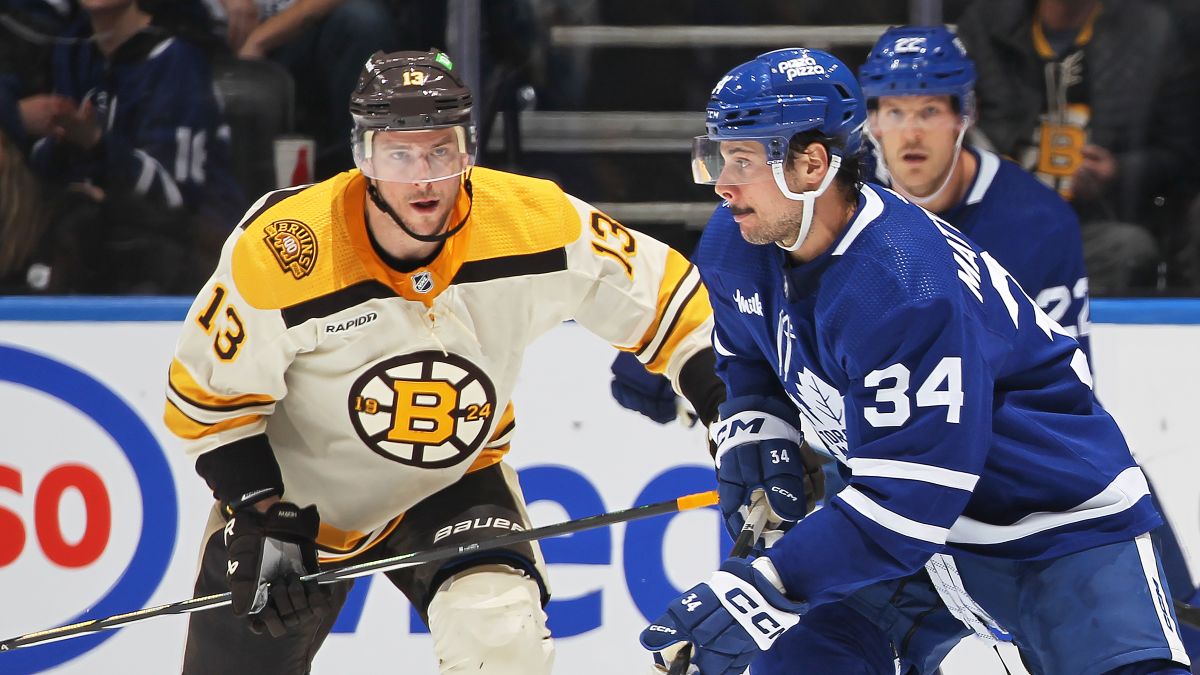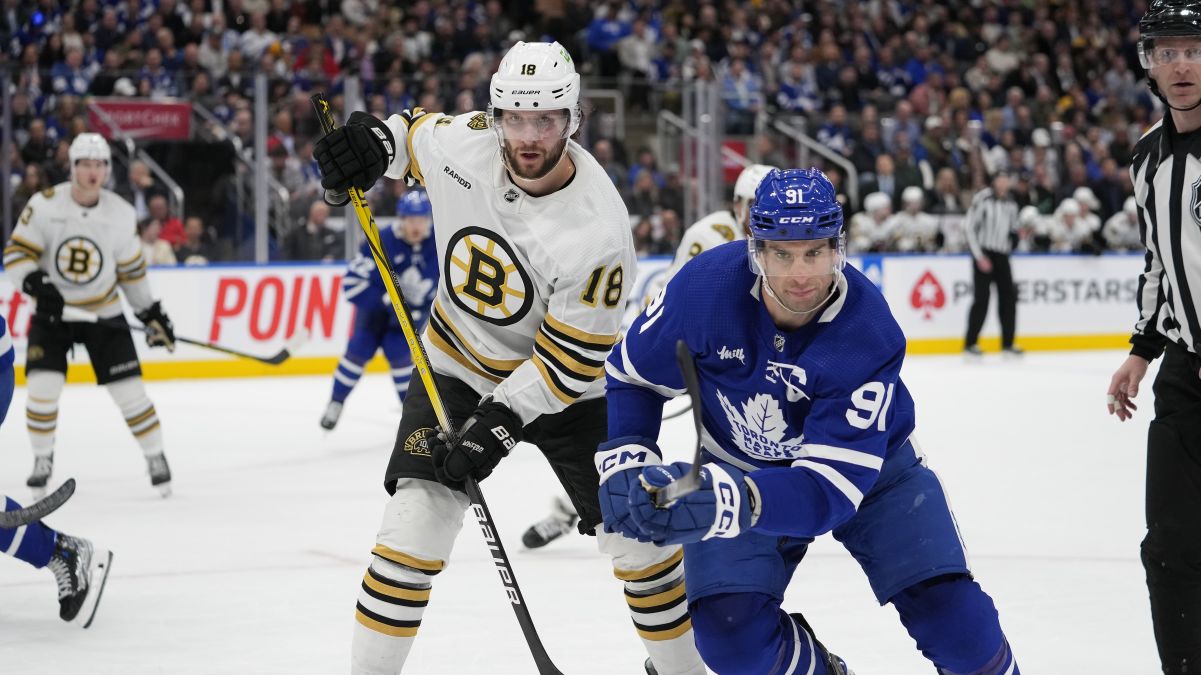
More of Mary Paoletti's interview with Zdeno Chara:
You seem like someone who takes comfort in control. Are there times out there when you feel like you're out of control on the ice? That a situation is out of control?
I don't feel that way. There are times when we are losing games or when the opposite team is playing really well . . . there are parts of the season when you're going to lose games and you aren't playing your best hockey . . . but never I feel like we are -- or I am -- out of control of the situation. You're going to win some and you're going to lose some and you're going to try to win as many as possible and to win more than you lose, but . . . I would maybe correct that. Maybe not as being a control person. I'm a very organized person. I like being organized and to know what we are doing and how to get better. I'm a disciplined person.
I've noticed is that you're often handling the blade of your stick...you're doing it almost every time a play dies. What is that? Is that just a habit?
Smiles It may be a little bit of a habit. I don't like to have frozen snow on my blade. Or ripped tape. I just don't know why, I immediately have to cut it out or get rid of that frozen snow or ice. It really changes the direction of the way you pass and move the puck.
In April of 2009 you were asked what your greatest career moment was and you said you hadn't had it yet. Can there be a greater moment in your career than winning a Stanley Cup? What would satisfy someone like you who's so driven?
For sure, winning the Stanley Cup would be top of the list before leaving hockey, right? Winning Norris trophy was really, really a nice feeling. It was great. It is something that, even if it is personal or individual, I feel like the team helped me. It's such a great satisfaction that all that hard work paid off. Maybe some people are not believing me being the right captain or they are questioning my leadership. I want to prove them wrong. I think I am the right captain.
You're going to be, what, 330 or so kilometers from where you grew up when you're in Prague? What does it mean to be so close to home?
It means a lot. I'll be nervous for sure, playing in front all my friends and family live. But at the same time, I already did that. But it's going to be a little bit crazy I think, there's might be meetings with a lot of my friends and family. I have to make sure it doesn't affect my rink time or the time I spend with the team. It's going to be exciting, something different.
Your schedule is crazy. You have to focus on the Coyotes but at the same time you have all these other things going on . . . family, friends, etc.
I'm going to try to make as much time as I can for them, but in a way that doesn't affect anything. If I have some time, yeah, I'll see them for half-an-hour, an hour. But I just got back, I saw them, what, a month ago? Two months ago? I just got back, so, I think they should be happy with the time I can give.
So tell me something about you. People ask you stuff all the time but you never get a chance to say anything unprompted.
Laughs I don't know. You'd have to ask me. I don't know what to tell ya' . . . Pauses Yeah. You'd have to ask me because I don't know where to begin.
All right. What's good for you right now? What makes you happy? I know you're a very disciplined guy and training makes you happy . . . blah blah blah, we've heard that before . . .
A few things. Being healthy is number one: I'm happy when I'm healthy. Nothing really bothers me or my family when we're healthy. I'm happy when we are winning. I'm happy when . . . long pause . . . I don't see any big changes, bad changes with what's going on in the world . . . like when there's a leak in oil. There's so much bad stuff happening. When none of that's happening it makes me happy.
Boston Bruins
What sacrifices have you made?
Well, I made a lot of my sacrifices when I was quite young. When all my friends from school, or even the teams I played on went out, had a good time, went to movies, went to playgrounds or whatever, I stayed home and I worked out, I went for a run, I went on my bike . . . So, that fun part that they had, I didn't. But I spent a lot of that time trying to get better. And, believe me, now I love it. I love that I can do what I love. And now when I meet with friends they wish they had sacrificed as much as I did, or anybody else. Now they have to get up at six in the morning and work 'til four in the afternoon at jobs they don't love. They missed their train. Now it's gone. It's one of those things with growing up. You get to choose what you want to do. I was very lucky, I guess, in the way that my dad was an athlete and he helped me work out when I was very young. Otherwise it would be too late. But now I don't really take it as much as sacrifice. I take it as, that's my job and that's what I do. You can be complaining about it or you can be excited about it.
From what I've read about you, it sounds like you had impressive maturity at a young age. When you were young, coaches told you you shouldn't play hockey and you had said something like, "a growing guy needs time to adjust to his body." How did you know that at age 14?
I didn't. I found that out later on. I think that sometimes coaches, they only see guys who are scoring goals -- which is fine, naturally, it's what you always like is players that are very skilled who will perform for you -- but especially when I was younger, they didn't realize I was still growing, I was still getting taller and taller, and my body had to fill in with muscle and I had to learn coordination and all that. And it took some time and they didn't give it to me. So I had to leave and I had to go where they gave me enough time. And they didn't give it to me back home so I had to leave to another country. And I was 18 and I was living on my own, which wasn't easy. But being in a different country at 18 and living totally on your own . . . there was no adults, there was no somebody I was living with, I was totally on my own. I had one bedroom apartment and they gave me some money and said, 'Take care of yourself.' So, that's when it hits you. That's when it hits you that you have to really mature, it's your job. You can't be a kid anymore. It was such a big change . . . buying groceries, you have to cook for yourself, laundry smiling, laughing, eyes wide . . . clearly a big deal you were like, "Oh my God!" At 18 you were like, 'This is so hard.' But you get used to it and that's when really you have to mature because, again, I was going from a Junior to a men's team. And even the conversations in the locker room, it was so different, there was no like, 'Hey, uh, something I don't know . . . '
'What are you doing this weekend?'
Yeah! It was like 'Hey, my family, my kids' and you're like 'Wha-wha-what?' All of the sudden these conversations, there was this different perspective and it was so different.
Do you think back to that time a lot?
Smiling Yeah! Yeah.
What do you think you took away from that besides responsibility?
Exhales deeply Well, take care of myself, most of all. Up to that time your parents are taking care of you . . . cooking for you most of the time, doing your laundry, and all that stuff. And all of a sudden, you know, most of all it's taking care of yourself and learn to talk like an adult. If you want to talk to the coach you do it yourself. It's like straightforward 1-on-1 with the coach or with the GM. So yeah, you had to know how to have conversations on different levels and be an adult.


